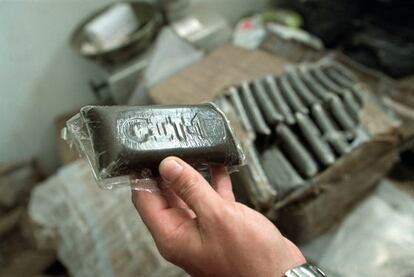Paying a heavy price for an easy buck
Economic crisis sees more Spaniards jailed abroad for drug-trafficking offenses

"Estefanía Gutiérrez, telephone!" someone shouts at the other end of the line. With background noises featuring that of children playing, one would not immediately guess that this is the sound of life in a prison. But Palmasola Prison, located in the Amazonian city of Santa Cruz de la Sierra in Bolivia, is reputed to be one of the most conflictive in Latin America.
Estefanía, a native of Valladolid, is one of the 2,443 Spaniards currently incarcerated in foreign countries all over the world. Of this number, 83 percent were detained in connection with drug trafficking.
In the last four years, the number of Spaniards held abroad has risen by 33 percent. Many were trying to solve their economic hardships illegally, most choosing the same route: drugs.
Estefanía is 23 years old and is already familiar with taking risks away from her home country. She was working as a waitress in Bolivia when she became acquainted with mafiosos who offered her 8,000 euros to smuggle six kilos of cocaine to Spain. The task was not as easy as they led her to believe, and she has been locked up since last December.
"They told me it would be very simple, that they would buy off a policeman at the airport and I would have no problems. It was a lot of money, and very easy," she explains at the other end of the phone. It's a classic story, one that has landed 2,009 Spaniards in prisons all over the world.
Of the 1,300 Spaniards jailed in Latin America, 1,196 (or 95 percent) are in prison for drug-related crimes. Most of the rest were convicted on charges of robbery, murder and fraud.
Together with the Foreign Ministry, the NGO Movement for Peace has spent 12 years campaigning for better awareness of sentencing in foreign countries to deter those tempted by an apparently easy buck.
Less funding for "eventualities"
Government budget cuts have also affected the amount designated to protect Spanish nationals abroad. The Spanish consular service has a fund to cover costs of any incidents travelers may have whilst abroad, but this has been cut in half from 4.1 million euros in 2011 to 2.3 million this year.
With the money, the state is able to provide financial aid for emergency evacuations or hospitalizations. Some of this money is also given to those in prisons, where conditions are usually worse than in Spain. Although the handout barely exceeds 150 euros, this kind of help is not usual in other countries.
"In many cases, and particularly in prisons outside of Europe, we're told that inmates have to pay for tiling on the floor, or a mattress," explains Ana Navalmoral of the Movement for Peace. The NGO points out that in the light of the cuts, these prisoners will be the most affected - the state's priority is for incidents related to travel, which leaves those detained in second place.
"People usually don't know this, but in some countries just consuming drugs may lead to the death penalty," explains Jesús Díaz, a spokesman for the ministry. In Bolivia, where 80 Spaniards are currently being held, legislation is very severe: a sentence of 10 to 20 years for drug dealing, and eight to 12 for trafficking.
Eight months have passed since Estefanía was arrested, and neither she nor her family know when the trial will take place. "I've been told that I could be jailed for up to eight years," she says, resigned. "Now I know that 8,000 euros is very little money for the situation I'm now in."
She has had to go through most of the ordeal alone. "Before, a friend would visit me, but it's been a while since I last saw him."
Workers at the Spanish Embassy in Bolivia also visited a couple of times. "The first time, they left me some money, as you need it to get anything done here. They told me they couldn't give me any more due to the crisis."
Movement for Peace tries to get help for those in prison from the consulate. "They need contact from the outside world, so we send them news and try to arrange some sort of contact with their families," explains María José Moreno, a member of the organization. "If they need medicine, we try to send them some, and demand additional attention from consulate workers."
As Gutiérrez has not yet been sentenced, she cannot request a transfer to a Spanish prison. She knows and accepts this, but is still hopeful - Bolivia is one of the 30 countries Spain has an extradition agreement with.
Tu suscripción se está usando en otro dispositivo
¿Quieres añadir otro usuario a tu suscripción?
Si continúas leyendo en este dispositivo, no se podrá leer en el otro.
FlechaTu suscripción se está usando en otro dispositivo y solo puedes acceder a EL PAÍS desde un dispositivo a la vez.
Si quieres compartir tu cuenta, cambia tu suscripción a la modalidad Premium, así podrás añadir otro usuario. Cada uno accederá con su propia cuenta de email, lo que os permitirá personalizar vuestra experiencia en EL PAÍS.
¿Tienes una suscripción de empresa? Accede aquí para contratar más cuentas.
En el caso de no saber quién está usando tu cuenta, te recomendamos cambiar tu contraseña aquí.
Si decides continuar compartiendo tu cuenta, este mensaje se mostrará en tu dispositivo y en el de la otra persona que está usando tu cuenta de forma indefinida, afectando a tu experiencia de lectura. Puedes consultar aquí los términos y condiciones de la suscripción digital.








































